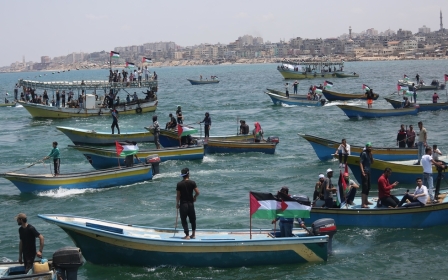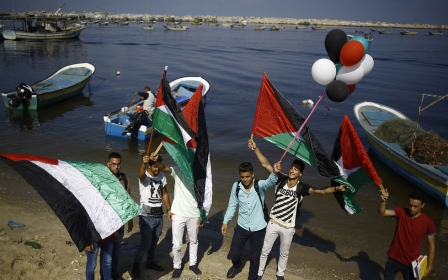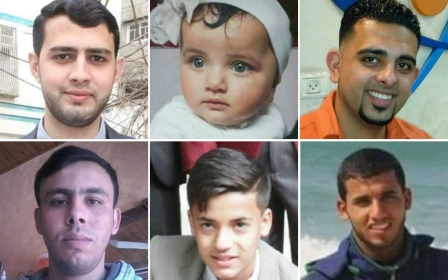Israel bombs Gaza militant sites amid heaviest rocket fire since 2014
Palestinian fighters launched their heaviest barrages against Israel since the 2014 Gaza war on Tuesday and Israeli aircraft struck back, in a surge of fighting after weeks of border violence.
Three Israeli soldiers were wounded by shrapnel, the military said, after dozens of mortar bombs and rockets were fired from the Gaza Strip, triggering warning sirens in southern Israel throughout the day. There were no immediate reports of Palestinian casualties.
Israeli jets hit more than 55 targets belonging to armed groups in Gaza, including a cross-border tunnel under construction, a Reuters report said, citing Israel's military.
In a rare joint statement, Islamic Jihad and the Qassam Brigades, Hamas's military wing, said they took "joint responsibility for the striking of military positions and Zionist settlements surrounding the Gaza Strip".
The statement added their fire was a response to Israeli attacks targeting their positions in recent days.
The Israeli intelligence minister, Israel Katz, said the country was "at the closest point to the threshold of war" since the seven-week conflict with Palestinian militants four years ago.
"If the firing does not stop, we will have to escalate our responses and it could lead to a deterioration of the situation," Katz said on Army Radio.
Daoud Shehab, of Islamic Jihad, said Egyptian officials had been in contact with the group to try to restore calm. He said Islamic Jihad did not want the violence to escalate and blamed Israel for the flare-up.
"If Israel abides by calm and ceases all forms of aggression against our people in Gaza, we will also maintain calm," he said.
Jonathan Conricus, a spokesman for the Israeli army, said the most extensive strikes from Gaza since the 2014 war also drew "the largest retaliatory attack" from Israel since that conflict.
The Israeli military said more than 70 projectiles were fired on Tuesday. Several were shot down by its Iron Dome rocket interceptor system while others landed in empty lots and farmland.
One exploded in the yard of a kindergarten, damaging its walls and scattering the playground with debris and shrapnel, about an hour before it was scheduled to open for the day.
Violence has soared along the Gaza frontier in recent weeks, during which 116 Palestinians were killed by Israeli fire at mass demonstrations calling for Palestinians' right to return to ancestral lands now in Israel.
A Hamas spokesman defended Tuesday's attacks as a "natural response to Israeli crimes". An Islamic Jihad spokesman said "the blood of our people is not cheap".
Palestinian President Mahmoud Abbas, who heads the Fatah faction that is dominant in the occupied West Bank and is a bitter rival of Hamas and Islamic Jihad, said Israel had used "vigorous aggression" against Gaza that proved it did not want peace.
The UN Security Council will meet Wednesday to discuss Palestinian rocket strikes on Israel, at the request of the United States which wants the top UN body to strongly condemn the attacks.
"Mortars fired by Palestinian militants hit civilian infrastructure, including a kindergarten," US Ambassador Nikki Haley said in a statement.
"The Security Council should be outraged and respond to this latest bout of violence directed at innocent Israeli civilians, and the Palestinian leadership needs to be held accountable for what they're allowing to happen in Gaza."
Powerful explosions
Plumes of smoke and dust rose from the sites hit in the Israeli air strikes. The powerful explosions shook buildings nearby, causing panic among rush-hour crowds on streets and in markets. The Gazan ministry of education said shrapnel from one missile flew into a school.
Nickolay Mladenov, the UN's special coordinator for the Middle East peace process, said he was deeply concerned by "the indiscriminate firing of rockets by Palestinian militants from Gaza towards communities in southern Israel".
Amid international condemnation of its use of lethal force at the mass demonstrations that began on 30 March, Israel said many of the dead were militants and that the army was repelling attacks on the border fence.
Palestinians and their supporters say most of the protesters were unarmed civilians and Israel was using excessive force against them.
Off Gaza's coast on Tuesday, the Israeli navy intercepted a boat that organisers of the Palestinian border protests launched from the enclave in a challenge to an Israeli maritime blockade.
The military said the vessel was stopped without much incident and would be towed to the Israeli port of Ashdod where the 17 people on board would be questioned and then returned to the Gaza Strip.
More than two million Palestinians are packed into the narrow coastal enclave. Israel withdrew its troops and settlers from Gaza in 2005 but, citing security concerns, maintains tight control of its land and sea borders, which has reduced its economy to a state of collapse.
Egypt also restricts movement in and out of Gaza on its border.
Middle East Eye propose une couverture et une analyse indépendantes et incomparables du Moyen-Orient, de l’Afrique du Nord et d’autres régions du monde. Pour en savoir plus sur la reprise de ce contenu et les frais qui s’appliquent, veuillez remplir ce formulaire [en anglais]. Pour en savoir plus sur MEE, cliquez ici [en anglais].




